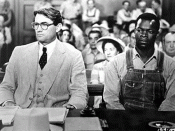For many, ideals and beliefs are fostered in the home, generally influenced by one's parents. There are, however, countless young people, such as Jem and Scout, for whom this is not possible, because the only home they know is one broken by the death of a mother. In such a situation, the responsibility of the endowment of morals lies solely with the remaining parent. Harper Lee's To Kill a Mockingbird tells of one man's struggle to impose moral character upon his children being raised in a community of malevolence. Atticus Finch strives to set forth his values "ÃÂ integrity, courage, and righteousness "ÃÂ upon Jem and Scout. Throughout the novel, he goes about doing so in several ways, generally characterized by his actions, and by the end his efforts seem successful. Atticus imposes his moral values on Scout and Jem, both by creating situations which test their moral strength and by providing his own behavior as an example, the success of which is confirmed in the ethical metamorphosis that Jem and Scout undergo during the novel.
Atticus' primary goal as a parent is the instillation of his fundamental values and ethos into Scout and Jem. Perhaps the trait that is most easily seen in Atticus and that he tries hardest to pass on to his children is his passion for justice and equality. Atticus worries that Scout and Jem are exposed to racism in Maycomb, and fights to ensure that they do not fall into that pit of hatred. This fear can be seen in a conversation between Atticus and Uncle Jack, in which Atticus confesses, ""ÃÂWhy reasonable people go stark raving mad when anything involving a Negro comes up, is something I don't pretend to understand"æI just hope that Jem and Scout come to me for their answers instead of listening to the town. I hope they trust me enough"æ'"à(88) Atticus wants his children to respect all people, and to disregard racial divisions between them. He demonstrates this most clearly when asked if he is a "nigger lover"àas he had been accused. To this he responds, ""ÃÂI certainly am. I do my best to love everybody"æ'"à(108) This reveals Atticus' truest feature: he, unlike most of Maycomb, looks past all differences to find humanity in every person. Equality, though, is not the only passion that Atticus wants his children to adopt.
As well a love for justice, Atticus wants Scout and Jem to be amiable people. This is most evident when Atticus finds that Scout has been involved in several fights. He instructs her to ""ÃÂ...just hold your head high and keep those fists down"æTry fighting with your head for a change...'"à(80) Similarly, Atticus wants his children to learn a nobler meaning of courage. He defines it as "when you know that you're licked before you begin, but you begin anyway."à(116) Amiability and courage, compounded with his ideals of equality, make up a triumvirate of values which, in Atticus' mind, compose a virtuous person. To build such righteousness in Jem and Scout, Atticus infuses their personalities with these values through his actions and through situations which he creates. To emphasize his belief in justice, and to reinforce his definition of courage, Atticus represents Tom Robinson. When explaining to Uncle Jack why he accepted the case, Atticus ponders, "Judge Taylor pointed at me and said, "ÃÂYou're It.' "æBut do you think I could face my children otherwise?"à(88) Here, Atticus shows the reader his priorities as a parent. Knowing the sacrifices inherent with defending a black man, Atticus saw only the example he would set for Jem and Scout if he were not to accept the case. Defending Tom Robinson also reiterated Atticus' message of what courage really is. Upon learning that Atticus will likely lose the Tom Robinson case in court, Scout wonders why, then, Atticus had taken the case. His response to this question corresponds perfectly with his definition of courage, which is that, ""ÃÂsimply because we were licked a hundred years before we started is no reason for us not to try to win.'"à(76) Atticus is trying to teach Scout that the likelihood of failure should never influence a decision. This, however, is not the only time when Atticus demonstrates the meaning of courage.
Another display of courage is revealed in Jem and Scout's frequent visits to Ms. Dubose. When Jem damages Ms. Dubose's camellia bushes, Atticus directs him to visit her regularly. Yet Atticus explains to Jem that, ""ÃÂif you hadn't lost your head I'd have made you go read to her. I wanted you to see something about her "àI wanted you to see what real courage is"æ'"àThis proves that Atticus creates this situation, for no other reason than to illustrate courage. The situation shows two important features of Atticus' method of parenting. First, he sets up situations for Jem and Scout in order to teach them meaningful lessons about life. Also, it shows that he is not too "free"àwith them. At times it seems as though Jem and Scout can get away with many things unpunished, but here Atticus imposes a stern chastisement on Jem.
There are other situations where Atticus tries to teach Jem and Scout the meaning of courage. He keeps secret his past, and the nickname "One-Shot Finch."ÃÂ He does so because he, "wanted you to see what real courage is, instead of getting the idea that courage is a man with a gun in his hand."ÃÂ (116) This quote shows that Atticus hides his past from his children in the hope they will, unlike most of Maycomb, think of valor in a moral sense. As the novel progresses, we see how this method of parenting proves successful.
The success of Atticus' manner of parenting can be seen in Scout and Jem's newly developed virtues. On several occasions, Scout resists the urge to fight, bearing in mind Atticus' advice. This shows that Atticus was successful in molding her into a slightly friendlier person. Additionally, Scout and Jem are more principled because of Atticus' lessons. Scout reaches this realization in the very last moments of the story. She tells us that, ""ÃÂAtticus was right. One time he said you never really know a man until you stand in his shoes and walk around in them. Just standing on the Radley porch was enough."ÃÂ (279) In this quote, Scout expressly indicates that she has truly learned from Atticus. She has also gained a sense of benevolence, as she regrets her selfish past, recalling, "[Boo] gave us two soap dolls, a broken watch and chain, a pair of good-luck pennies, and our lives. But neighbors give in return. We never put back into the tree what we took out of it: we had given him nothing, and it made me sad."ÃÂ (278) Scout's lamentation about her selfishness attests to Atticus' success in instilling a sense of generosity. These are all blatant indications that, indeed, Atticus was a successful parent.
And so the reader discovers two hundred eight-one pages later that a single parent in a land, where, according to Phil Ochs, "they're teachin' all the children that they don't have to care,"ÃÂ1 can, indeed, raise young people of character and of virtue. This one man manages to maintain a sense of justice, and even passes that trait on to his children, in a time and place where integrity is uncommon. Atticus Finch, of a rare breed of Maycomb residents who believe in justice, equality, and a refined courage, through his actions, successfully passes those virtues on to his children.





